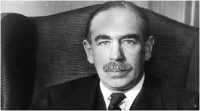Difference between revisions of "John Maynard Keynes"
m (1 revision) |
|||
| Line 1: | Line 1: | ||
| + | [[File:jmkeynes.png|200px|thumb|left|John Maynard Keynes]] | ||
| + | |||
==Country== | ==Country== | ||
| Line 13: | Line 15: | ||
==Notable Achievements== | ==Notable Achievements== | ||
| − | + | CB, FBA | |
==Description== | ==Description== | ||
| − | Economist, | + | Economist, and founder of the Keynesian school of economic thought, which espouses public and government intervention in the economy to ensure economic growth, full employment, price management, and to minimize economic cyolicality. A principal architect of the global economic system during the Great Depression and post World War II, including the creation of the World Bank and International Monetary Fund. Notable academic book is 'The General Theory of Employment, Interest, and Money' (1936), considered the foundation book of modern economics. One of Time Magazines' 100 most influential people of 20th century. Had many notable homosexual affairs during his time as a student at Cambridge University, though he married later in life. |
| + | |||
| + | ==Further Reading/Research== | ||
| + | |||
| + | * http://www.britannica.com/EBchecked/topic/315921/John-Maynard-Keynes | ||
| + | * http://www.bbc.co.uk/history/historic_figures/keynes_john_maynard.shtml | ||
| + | * http://www.maynardkeynes.org/ | ||
| + | |||
| + | <html><br /> | ||
| + | <a href="#" | ||
| + | onclick=" | ||
| + | window.open( | ||
| + | 'https://www.facebook.com/sharer/sharer.php?u='+encodeURIComponent(location.href), | ||
| + | 'facebook-share-dialog', | ||
| + | 'width=626,height=436'); | ||
| + | return false;"> | ||
| + | Share on Facebook | ||
| + | </a></html> | ||
Revision as of 21:29, 11 July 2014
Contents
Country
Great Britain
Birth - Death
1883 - 1946
Occupation
Academic
Notable Achievements
CB, FBA
Description
Economist, and founder of the Keynesian school of economic thought, which espouses public and government intervention in the economy to ensure economic growth, full employment, price management, and to minimize economic cyolicality. A principal architect of the global economic system during the Great Depression and post World War II, including the creation of the World Bank and International Monetary Fund. Notable academic book is 'The General Theory of Employment, Interest, and Money' (1936), considered the foundation book of modern economics. One of Time Magazines' 100 most influential people of 20th century. Had many notable homosexual affairs during his time as a student at Cambridge University, though he married later in life.

